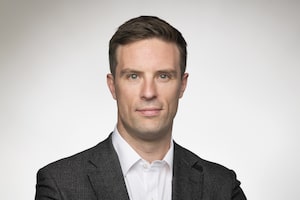BMO’s asset management arm plans to launch the BMO Carlyle Private Equity Strategies Fund around May. Towers of the TD Centre (left) and the Bank of Montreal, in Toronto, on Dec. 6, 2017.Fred Lum/The Globe and Mail
Bank of Montreal BMO-T is joining forces with Carlyle Group Inc. CG-Q to launch a fund targeting high net-worth clients, as part of a push to open up markets for privately-owned assets to a broader array of individual investors.
BMO’s asset management arm plans to launch the BMO Carlyle Private Equity Strategies Fund around May. The bank, which announced the partnership with the U.S.-based private equity giant on Friday, is pitching it as a way for individual investors to buy and sell a fund with exposure to an array of private equity investments that are typically long-term commitments, available exclusively to the largest institutions and the ultra-wealthy.
Where most traditional private equity funds lock up investor money for years, the BMO Carlyle one has no fixed end date and has monthly windows when investors can redeem at least some of their money, within limits. The fund also has a comparatively low minimum investment of $25,000.
When it launches, the BMO Carlyle fund will be a companion to one that BMO launched last year as a joint venture with Swiss-based private equity firm Partners Group AG. That fund, which opened last June, invests in a mix of infrastructure, real estate, private equity and private credit assets, and is marketed as a one-stop way to get broad exposure to private markets.
From June to Dec. 31 last year, the BMO Partners Group fund attracted $131-million from about 1,000 individual investors. Most often, those were investors with $1-million to $10-million in assets, though it has also attracted ultra-high net-worth investors and some mutual fund clients from BMO’s asset manager.
The BMO Carlyle fund, meanwhile, will offer exposure strictly to private equity, primarily through secondaries investments – stakes in a broad range of funds purchased at a discount from earlier fund investors – with some direct and co-investments in new private equity deals.
“You get access to institutional-quality private markets in a format that is you can buy when you want, sell if you need,” said Jeffrey Shell, head of alternative investments at BMO Global Asset Management, in an interview. “Our hope is that over time this becomes our next great success story alongside ETFs,” or exchange-traded funds.
The market for private assets has been exploding in size, with private capital under management in North America reaching US$7.7-trillion last year, including US$3.6-trillion in private equity, according to data from Preqin. Major private capital investors have been rushing to create investment products tailored to retail investors, seeking to tap into a vast source of wealth with the promise of higher returns compared with public stocks and bonds.
In joining forces with Carlyle, BMO is trading on the credentials of the private-equity heavyweight, with US$426-billion of assets under management, including US$66-billion through its Alpinvest division, which will manage the BMO Carlyle fund. In return, Carlyle gets quick access to the Canadian market through BMO’s established brand and large network of advisers to market the fund to clients.
The head of Carlyle Wealth Strategy, Shane Clifford, said in a statement that the partnership with BMO “is a significant milestone for Carlyle’s wealth business in Canada, as we continue to broaden our reach in the channel globally.”
The secondaries market for selling private equity stakes is booming, in part because many of the world’s largest institutional investors are trying to pare back their exposure to private equity to stay within target allocations. Private equity has also been going through a rough patch, as high interest rates put a chill on deal making, which makes it harder for private equity investors to sell portfolio companies and return cash to fund investors.
That creates an opportunity for secondaries specialists such as Carlyle’s Alpinvest, as major investors look to sell fund stakes at a discount to raise cash. And because private equity investors don’t want to crystallize losses from assets in their portfolios that may be struggling, “what they’re selling right now, and what’s clearing in the market, is the very best assets,” Mr. Shell said.
One of the challenges to attracting retail investors to private markets is convincing them they are truly getting access to those top-quality assets, which have historically been reserved for multibillion-dollar investors. Mr. Shell said BMO chose to work with Carlyle because of the rigorous way it assigns assets to its funds, and its experience at doing the work to make companies more valuable.
“They don’t say, ‘Okay, this is a great investment, it’s going to the largest institutions in the world. Whatever’s left over, we’re going to put into a retail vehicle.’ That’s not how they operate,” Mr. Shell said. “They have a fair process where all the best assets go in the places where they’re needed.”
 James Bradshaw
James Bradshaw